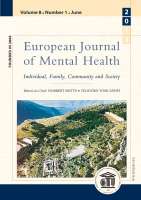Social Inequalities in Self-Perceived Health: Comparing Hungarian and Ethnic Minority Adolescents from Transylvania, Rumania
Social Inequalities in Self-Perceived Health: Comparing Hungarian and Ethnic Minority Adolescents from Transylvania, Rumania
Author(s): Bettina Pikó, László Brassai, Kevin M. FitzpatrickSubject(s): Social Sciences
Published by: Semmelweis Egyetem Mentálhigiéné Intézet
Keywords: subjective SES; health inequalities; culture; unemployment; family structure; self-perceived health; adolescence; parents
Summary/Abstract: The aim of this study is to analyse the relationship between parental socioeconomic status (SES) (both objective and subjective) and perceived health in two samples of Eastern European adolescents and to detect gender differences in the background variables. The data used in this study came from two cross-sectional surveys of high school students’ health in Southern Hungary (Szeged and its metropolitan area, N = 881, mean age = 16.6 years, S.D. = 1.3 years) and Middle Transylvania, Rumania (Sfântu Gheorghe/Sepsiszentgyörgy and its metropolitan area, N = 1,977, mean age = 16.8 years, S.D. = 1.0 years). Both objective and subjective social status measures were utilised. SES self-assessment is a strong, universal and gradient-like predictor of adolescents’ self-perceived health. Objective socioeconomic variables are weaker and appear to have a nongradient-like relationship with self-perceived health. The greatest sample difference was that parents’ unemployment status played a greater role in self-perceived health among Transylvanian youth. The role of socioeconomic factors appears to be more salient in girls. Social inequalities in self-perceived health may be detected among adolescents but in seemingly different ways than among adults.
Journal: European Journal of Mental Health
- Issue Year: 8/2013
- Issue No: 01
- Page Range: 29-45
- Page Count: 15
- Language: English

